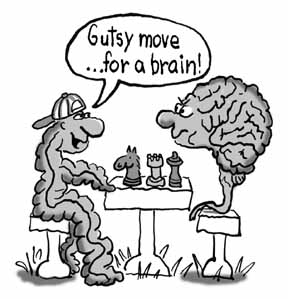
We’re all marvellous at setting intentions. If thinking rationally about the benefits of going to the gym were enough to get us into a regular exercise routine, we’d all be sporting six-packs and buns of steel. Or, alternatively, we’d be fully read in all the classics and conversant in at least five foreign languages. Much economic theory is predicated on people being rational actors – if that were true, the word procrastination wouldn’t exist.
Despite how it may seem on the surface, much of our thinking and decision-making happens outside of the brain. Understanding how and why this occurs is actually vital to unpacking the power of hypnosis to make important therapeutic interventions.
Pick a card, any card
We begin with an experiment called the Iowa Gambling Task, devised by Neuroscientist Antonio Damasio. It involves subjects picking cards from four virtual decks, with the cards representing in-game punishments or rewards. However, two of the four decks are more heavily stacked with reward cards, while the other two are biased towards punishment. Healthy subjects reliably begin sticking with the ‘good’ decks pretty quickly. Their bodies demonstrated a stress response (activation of sweat glands in the skin) when reaching for the ‘bad’ decks long before they became consciously aware of any pattern.
This experiment forms the basis of Damasio’s somatic marker hypothesis. The theory suggests that it’s not just the brain analysing possible decisions – the body is too. And this experiment suggest that the body is rather quicker at picking up patterns than the brain. This is what we talk about when we speak of gut feelings. In Behave, his epic book on the biology of human behaviour, Robert Sapolsky describes it thus: ‘the process is not a thought experiment; it’s an emotion experiment, in effect an emotional memory of a possible future.’ While the brain may process emotions, they are experienced in our whole physical being, as diffuse as our nervous system. We must appreciate, according to Damasio, that ‘the mind is embodied … not just embrained.’
Seriously, pick a card already (no, not that one)
In the BBC documentary series ‘The Brain’, David Eagleman speaks to a lady who suffered brain damage form a motorcycle accident. It resulted in her emotional (limbic) and logical-executive (pre-frontal cortex) brain areas becoming disconnected. While she is still able to process all the available information, without the emotional input she is unable to create a hierarchy of value, making it impossible to plump for one thing over another. It is quite moving to watch her fret to the point of tears about which food she should select from her own freezer – you can watch it here (the segment begins on around 14 mins).
In another example of embodied decision-making, we’ve all heard of errant men being described as thinking with their penises. While this is not entirely accurate, it is certainly fair to say that a cascade of hormones and autonomic responses can combine to create positive somatic markers. Knowing this, it is unsurprising that they can have the power to override the dry logical caveats about consequences and doing the right thing. Were the brain alone engaged, it is highly likely that thoughts of broken hearts, messy divorces and joint custody of kids/LPs/pets would feature far more prominently in deciding whether that fleeting moment of pleasure and ego-mollification is worth it.
How I can help you pick the right card
All this is of enormous interest to the hypnotherapist. Anxiety is, as I have often quoted, ‘thinking of something bad and acting is if it were true.’ It is a fundamentally pessimistic projection of oneself into the future. With any kind of anxiety, the body is sounding massive warning signals to the brain, saying under all costs avoid making the following decision (delete as applicable): getting on a plane/giving that speech/making that phonecall/running out of tobacco. The ability to rationalise any of these responses as unhelpful pales next to the fact our bodies are screaming out that doing any of these things is a terrible idea.
Under hypnosis, using relaxation and positive suggestion, we can change how the body feels, all the while guiding the mind toward a decision that runs in accordance with our deeper values: I like to travel/want to be my friend’s best man/run a successful business/be a healthy non-smoker. We’re essentially running a positive simulation that allows us to reappraise any given situation, casting the potential outcome of a decision in a whole new light. And once the body accepts what the mind has said all along, they can work together to help overcome the fear that holds us back.
